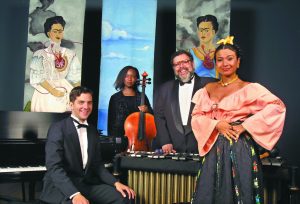On Monday night, November 1, Dodds Theater brought three women to life for a night of culture and wonder. The Latin American Student Association (LASA), along with the

Office of Intercultural Relations, brought The Core Ensemble to campus for a presentation of Tres Vidas (Three Lives), a play that celebrates the lives of three important Hispanic women.
The Core Ensemble is made up of three musicians: Wendy Law on the cello, Hugh Hinton on piano, and Michael Parola on percussion. The is also actress Rosanne Alamanzar. They provided various pieces of music throughout the production, including traditional Hispanic folk songs and the works of many famous Hispanic composers, such as Astor Pizzaolla. The play was written by award winning writer Majorie Agosin and designed as a “one woman show,” as Almanzar plays all three roles.
Tres Vidas began with the story of Frida Kahlo (1907-1954), one of the most famous and important Hispanic woman artists in history. As Kahlo, Almanzar made the audience laugh with the painter’s brash, yet independent and free-spirited personality. However, she still found time to enrich the audience on Kahlo’s life, her tremulous relationship with her husband, painter Diego Rivera, the injuries and hardships she suffered, and the style of her art. For this last lesson, Almanzar was accompanied on stage by Los Dos Fridas (The Two Fridas), one of Kahlo’s most famous works. It depicts two versions of the artist: the traditionally minded and traditionally dressed woman on the left and the independent, feminist Frida on the right. Both hearts are exposed, but the traditional Frida’s bleeds over the dress. Not only is the independent Frida’s heart intact, but it pumps blood into the other heart through a connected artery. This reinforces how passionately Kahlo felt towards her independence and strength.
The night suddenly took on a far darker tone as the story of Rufina Amaya began. Amaya (1943-2007) was the sole survivor of the El Mozote Massacre of December 11, 1981, in which the Salvadorian Army’s Atlacatl Battalion, trained by the U.S., massacred the entire village of El Mozote, El Salvador. After managing to hide and escape the village, Amaya tried telling the story of what happened, but both the Salvadorian and U.S. governments dismissed it. It would be years, thanks to the efforts of journalists Alma Prieto and Mark Danner, until Amaya’s story was finally confirmed, and she gained the respect she deserved. Tres Vidas brings us to a scene shortly after the massacre. As Amaya, Almanzar began screaming names: “Domingo! Cristino! Maria Dolores! Maria Lilian! Maria Isabel!” They were the names of her husband and children, who were killed in the massacre. Almanzar perfectly portrayed Amaya’s despair on stage, leaving the audience silenced.
The third and last act of the night was Alfonsina Storni. Storni (1892-1938) is Argentina’s most famous female poet. Like Kahlo, she faced several hardships in her life, and she believed strongly in the feminist movement, reflecting her beliefs onto her work. She developed breast cancer and, in 1938, came to La Perla beach in Mar del Plata, Argentina. There, it is believed she walked into the sea and drowned. As the cool and composed Storni, Almanzar charmed the audience with a couple of the poet’s selections and told of the events and feelings that led up to her suicide. Finally, she gave a poetic goodbye to the audience before walking off stage, signaling the end of Storni and Tres Vidas.
Roseanne Almanzar’s performance was brilliantly complemented by Law, Hinton, and Parola. Part-musical, drama, comedy, and biography, Tres Vidas is a must-see for anyone with an interest in Hispanic and Latin American culture, history, and music, or even just anyone who wishes to see a good play.










